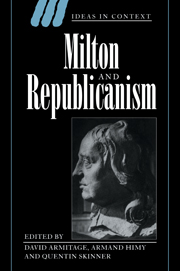Book contents
- Frontmatter
- Contents
- Notes on contributors
- Preface
- PART I DEFINING MILTON'S REPUBLICANISM
- PART II MILTON AND REPUBLICAN LITERARY STRATEGY
- PART III MILTON AND THE REPUBLICAN EXPERIENCE
- 8 Popular republicanism in the 1650s: John Streater's ‘heroick mechanicks’
- 9 Milton and Marchamont Nedham
- 10 Milton and the Protectorate in 1658
- 11 John Milton: poet against empire
- PART IV MILTON AND THE REPUBLICAN TRADITION
- Index
- Recent titles in the series include
10 - Milton and the Protectorate in 1658
Published online by Cambridge University Press: 27 October 2009
- Frontmatter
- Contents
- Notes on contributors
- Preface
- PART I DEFINING MILTON'S REPUBLICANISM
- PART II MILTON AND REPUBLICAN LITERARY STRATEGY
- PART III MILTON AND THE REPUBLICAN EXPERIENCE
- 8 Popular republicanism in the 1650s: John Streater's ‘heroick mechanicks’
- 9 Milton and Marchamont Nedham
- 10 Milton and the Protectorate in 1658
- 11 John Milton: poet against empire
- PART IV MILTON AND THE REPUBLICAN TRADITION
- Index
- Recent titles in the series include
Summary
Towards the end of Hobbes's Behemoth, or The Long Parliament, speaker B in the dialogue, the pupil, obligingly poses a question: ‘Seeing that there had been so many shiftings of the supreme authority, I pray you, for memory's sake, repeat them briefly in times and order.’ This is the cue for a brisk resumé by speaker A, the master: the Long Parliament, he says, gave way to the Rump, followed in turn by Cromwell's Council of State and the so-called Barebone's Parliament. ‘Fifthly’, A continues, from
December the 12th 1653 to September the 3rd 1658, it was in the hands of Oliver Cromwell, with the title of Protector. Sixthly, from September the 3rd 1658 to April the 25th 1659, Richard Cromwell had it as successor to his father. Seventhly, from April the 25th 1659 to May the 7th of the same year, it was nowhere. Eighthly, from May the 7th 1659, the Rump, which was turned out of doors in 1653, recovered it again; and shall lose it again to a committee of safety, and again recover it, and again lose it to the right owner.
The manner in which the story is told suffices to make Hobbes's feelings plain. A note of disdain is audible in the studied precision with which the succession of regimes is recorded, changing to one of derision as numbers and dates are abandoned for the final, headlong descent into anarchy. Of course, Hobbes, an avowed enemy of republicanism, could afford to be ironic about a sequence of events which he saw as a vindication of his political philosophy.
- Type
- Chapter
- Information
- Milton and Republicanism , pp. 181 - 205Publisher: Cambridge University PressPrint publication year: 1995
- 9
- Cited by



